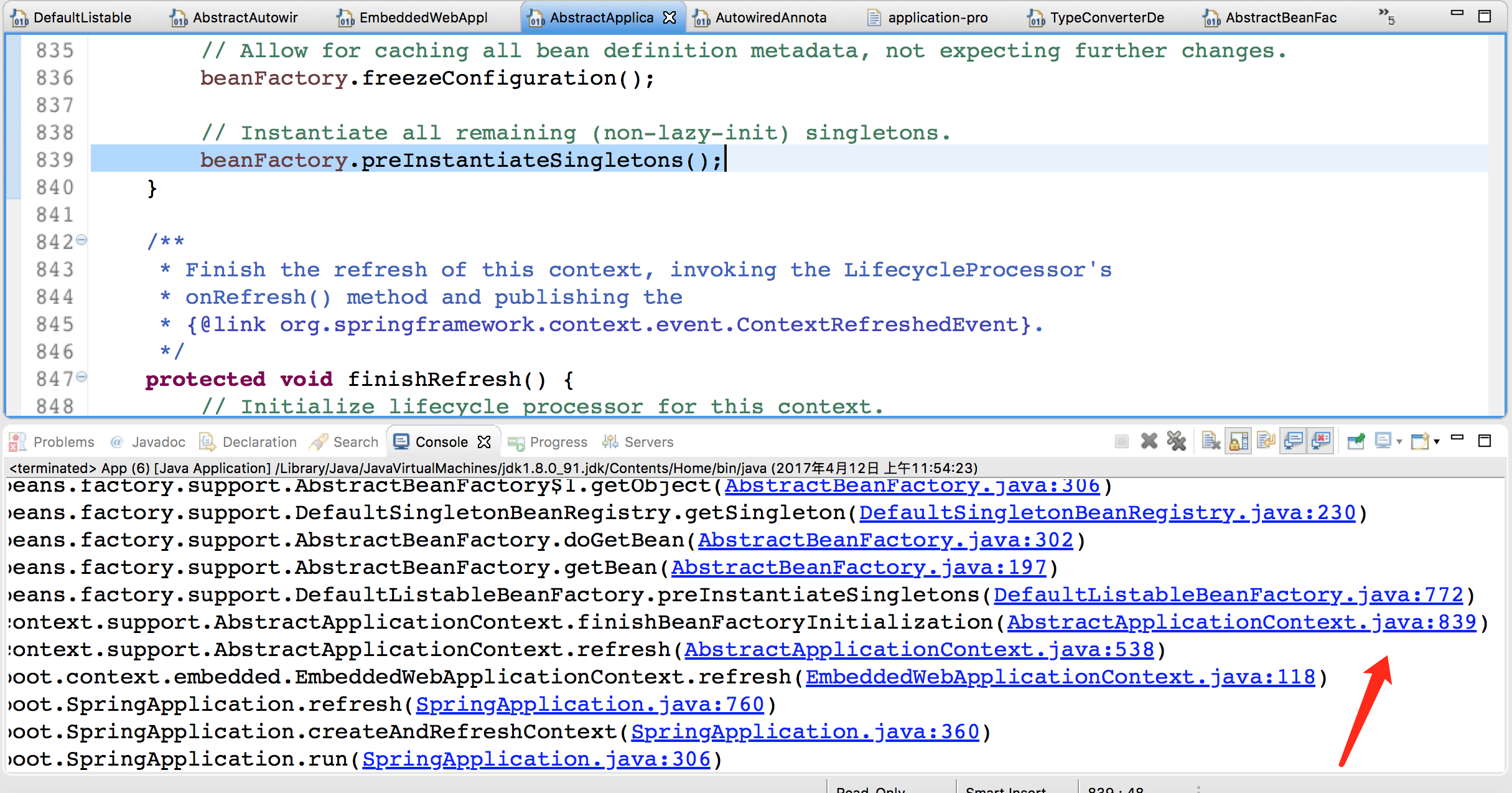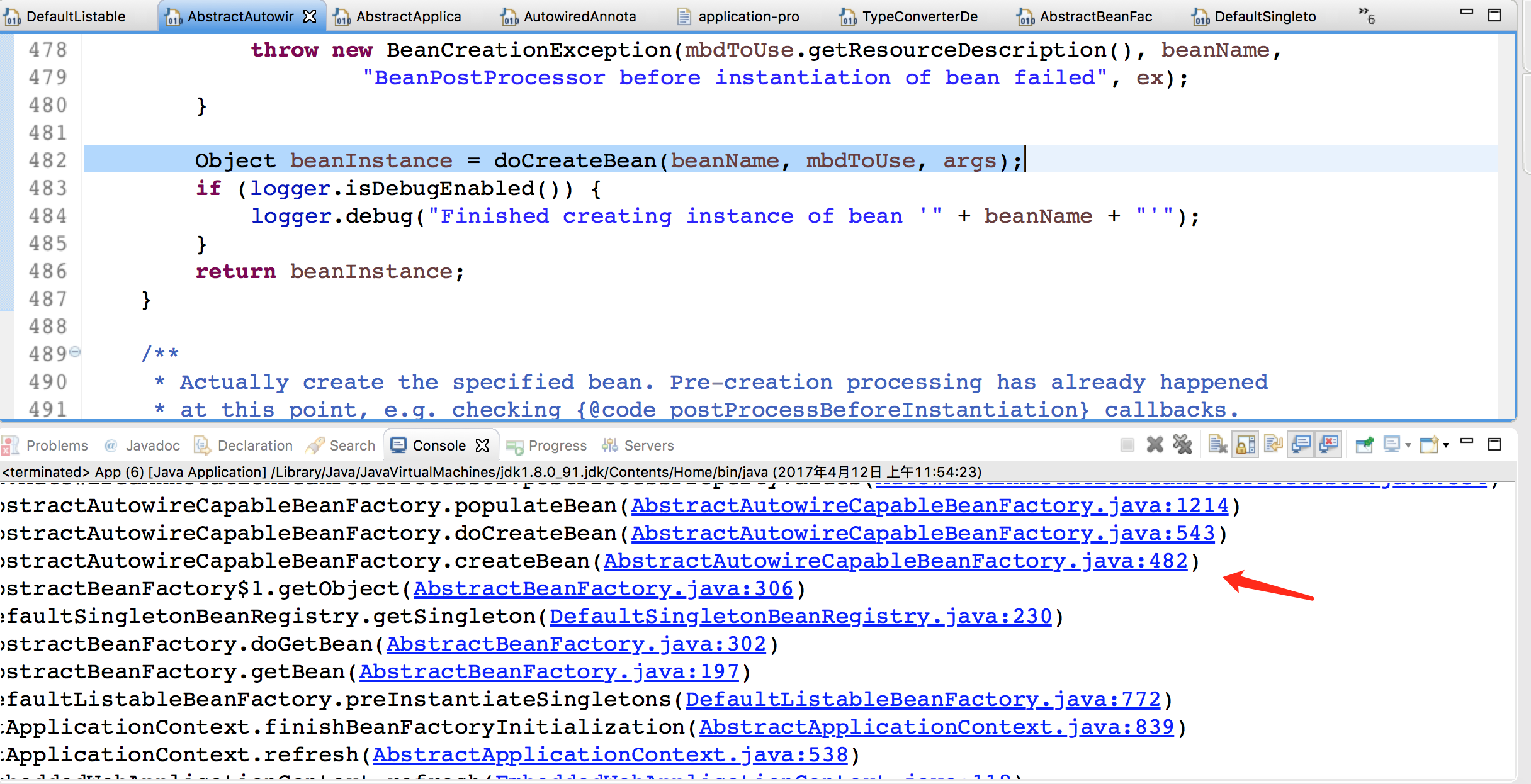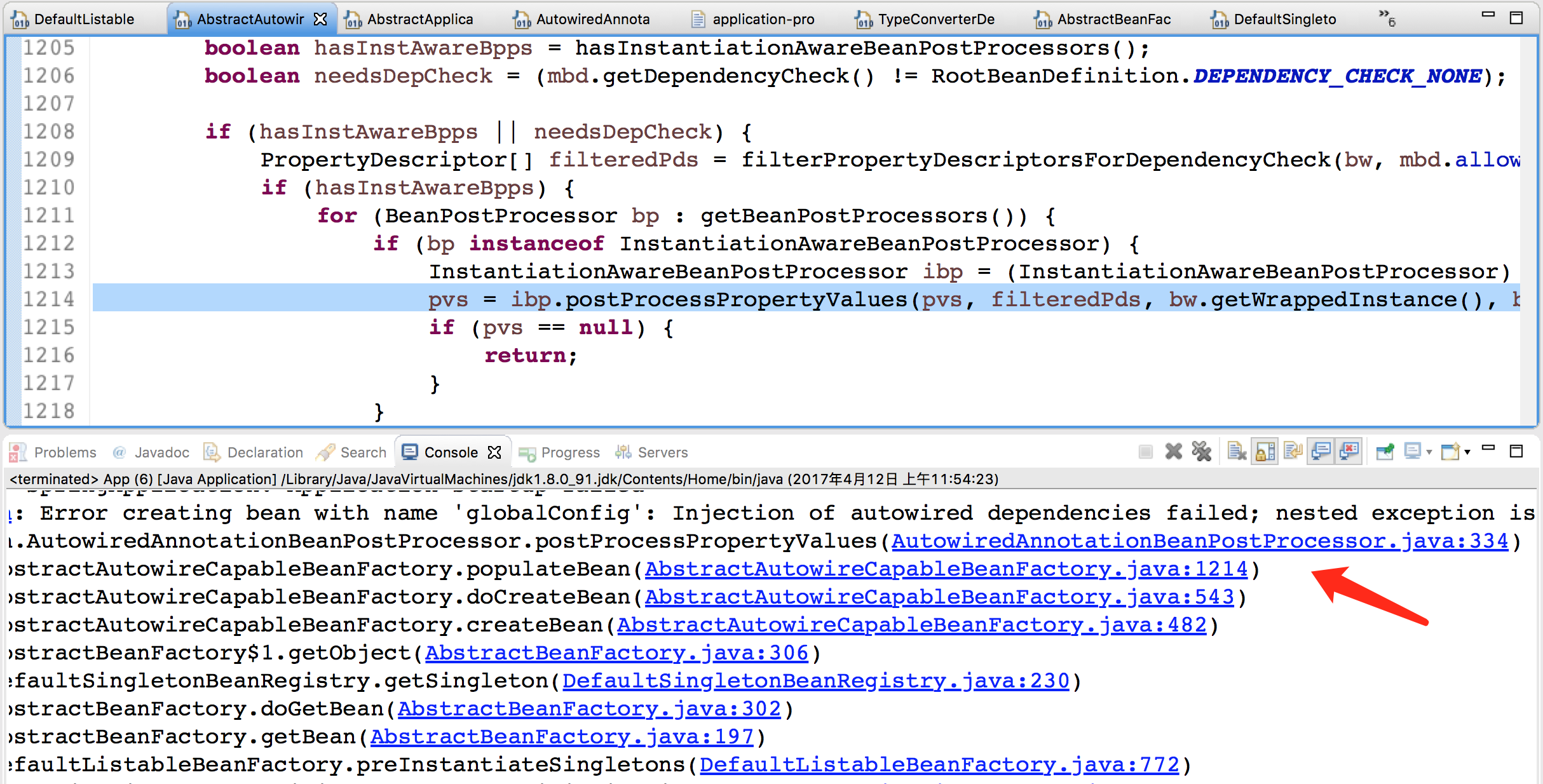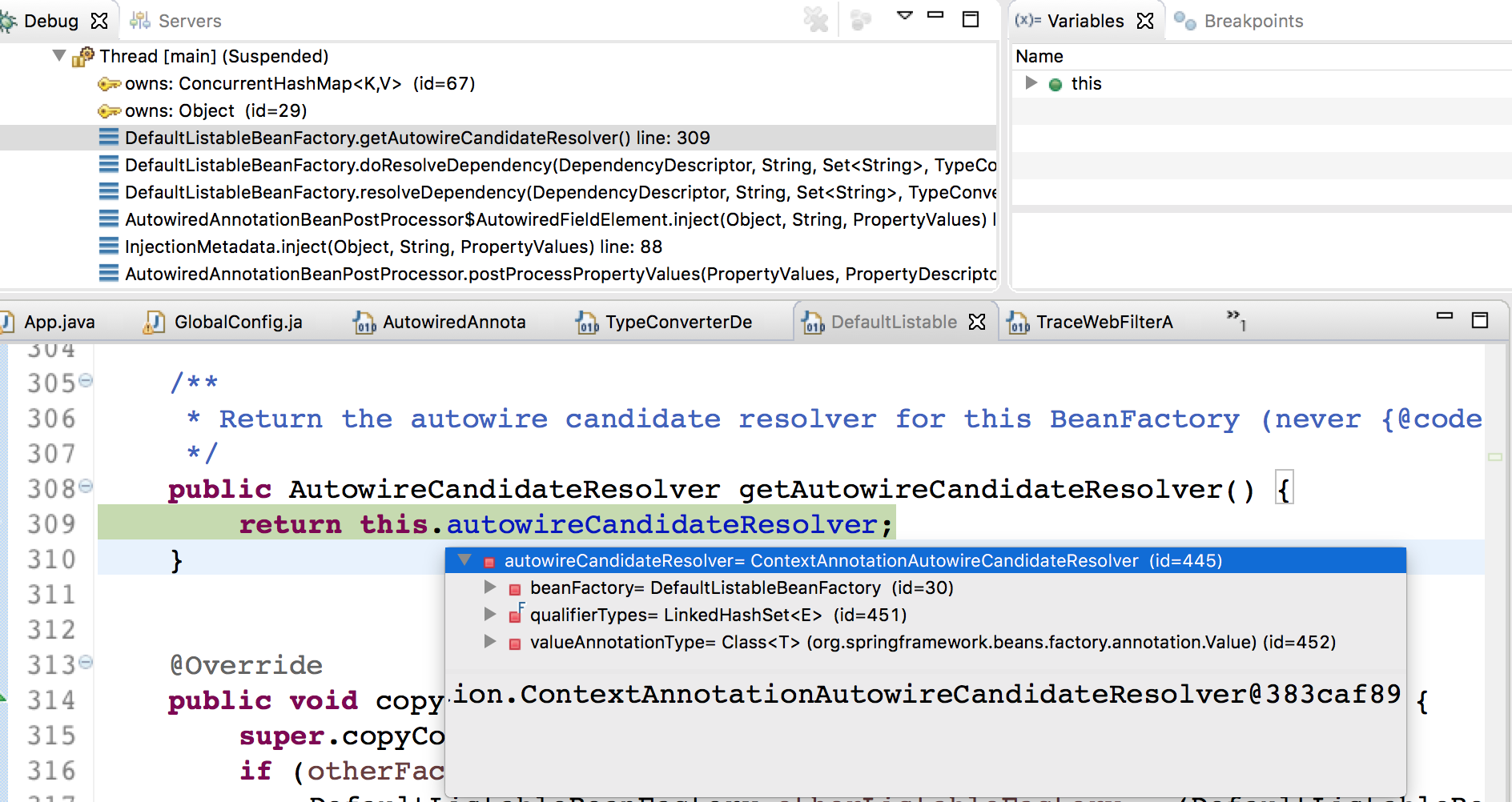@value


通过name来获取bean对象。

这一点eclipse就没有intelliJ好,拉到方法内部上面就不现实方法名了,这里是上面调用的方法的内部。



处理内部属性:

然后就在这里抛出异常了:

我们打个debug看看:


因为上面这个是循环处理,所以我们一直等到:

不为空:

我们进入下面的方法里看看:

不过貌似这个和我们哪个异常没有关系:



一不小心按跳过了。。。
我们继续吧:
也不是这个:

但是我们跟着走一遍没错的,然后在循环到报错的看就更清楚了:
这个跟上个不一样,这个是方法:


这个类挺有意思:

我们先来看看是哪个方法有注入需求:

下面这个应该就是核心方法了:

我们进入看看:

几组判断后进入下面方法:



return (isLazy(descriptor) ? buildLazyResolutionProxy(descriptor, beanName) : null);
一个很简单的判断:

没看清跳出来了:

又是一个非常大的方法,这就是spring。
跳出吧,我们继续我们的找异常之旅:
过了几十个,终于找到你了:

这个是个属性注入,@value嘛:


然后我们进入下一行代码:
value = beanFactory.resolveDependency(desc, beanName, autowiredBeanNames, typeConverter);
接着调用:DefaultListableBeanFacotory的方法doResolveDependency
@Override
public Object resolveDependency(DependencyDescriptor descriptor, String beanName,
Set<String> autowiredBeanNames, TypeConverter typeConverter) throws BeansException { descriptor.initParameterNameDiscovery(getParameterNameDiscoverer());
if (descriptor.getDependencyType().equals(javaUtilOptionalClass)) {
return new OptionalDependencyFactory().createOptionalDependency(descriptor, beanName);
}
else if (ObjectFactory.class == descriptor.getDependencyType()) {
return new DependencyObjectFactory(descriptor, beanName);
}
else if (javaxInjectProviderClass == descriptor.getDependencyType()) {
return new DependencyProviderFactory().createDependencyProvider(descriptor, beanName);
}
else {
Object result = getAutowireCandidateResolver().getLazyResolutionProxyIfNecessary(descriptor, beanName);
if (result == null) {
result = doResolveDependency(descriptor, beanName, autowiredBeanNames, typeConverter);
}
return result;
}
} public Object doResolveDependency(DependencyDescriptor descriptor, String beanName,
Set<String> autowiredBeanNames, TypeConverter typeConverter) throws BeansException { Class<?> type = descriptor.getDependencyType();
//获取注解@value的值
Object value = getAutowireCandidateResolver().getSuggestedValue(descriptor);
if (value != null) {
if (value instanceof String) {
String strVal = resolveEmbeddedValue((String) value);
BeanDefinition bd = (beanName != null && containsBean(beanName) ? getMergedBeanDefinition(beanName) : null);
value = evaluateBeanDefinitionString(strVal, bd);
}
TypeConverter converter = (typeConverter != null ? typeConverter : getTypeConverter());
return (descriptor.getField() != null ?
converter.convertIfNecessary(value, type, descriptor.getField()) :
converter.convertIfNecessary(value, type, descriptor.getMethodParameter()));
} if (type.isArray()) {
Class<?> componentType = type.getComponentType();
DependencyDescriptor targetDesc = new DependencyDescriptor(descriptor);
targetDesc.increaseNestingLevel();
Map<String, Object> matchingBeans = findAutowireCandidates(beanName, componentType, targetDesc);
if (matchingBeans.isEmpty()) {
if (descriptor.isRequired()) {
raiseNoSuchBeanDefinitionException(componentType, "array of " + componentType.getName(), descriptor);
}
return null;
}
if (autowiredBeanNames != null) {
autowiredBeanNames.addAll(matchingBeans.keySet());
}
TypeConverter converter = (typeConverter != null ? typeConverter : getTypeConverter());
Object result = converter.convertIfNecessary(matchingBeans.values(), type);
if (getDependencyComparator() != null && result instanceof Object[]) {
Arrays.sort((Object[]) result, adaptDependencyComparator(matchingBeans));
}
return result;
}
else if (Collection.class.isAssignableFrom(type) && type.isInterface()) {
Class<?> elementType = descriptor.getCollectionType();
if (elementType == null) {
if (descriptor.isRequired()) {
throw new FatalBeanException("No element type declared for collection [" + type.getName() + "]");
}
return null;
}
DependencyDescriptor targetDesc = new DependencyDescriptor(descriptor);
targetDesc.increaseNestingLevel();
Map<String, Object> matchingBeans = findAutowireCandidates(beanName, elementType, targetDesc);
if (matchingBeans.isEmpty()) {
if (descriptor.isRequired()) {
raiseNoSuchBeanDefinitionException(elementType, "collection of " + elementType.getName(), descriptor);
}
return null;
}
if (autowiredBeanNames != null) {
autowiredBeanNames.addAll(matchingBeans.keySet());
}
TypeConverter converter = (typeConverter != null ? typeConverter : getTypeConverter());
Object result = converter.convertIfNecessary(matchingBeans.values(), type);
if (getDependencyComparator() != null && result instanceof List) {
Collections.sort((List<?>) result, adaptDependencyComparator(matchingBeans));
}
return result;
}
else if (Map.class.isAssignableFrom(type) && type.isInterface()) {
Class<?> keyType = descriptor.getMapKeyType();
if (String.class != keyType) {
if (descriptor.isRequired()) {
throw new FatalBeanException("Key type [" + keyType + "] of map [" + type.getName() +
"] must be [java.lang.String]");
}
return null;
}
Class<?> valueType = descriptor.getMapValueType();
if (valueType == null) {
if (descriptor.isRequired()) {
throw new FatalBeanException("No value type declared for map [" + type.getName() + "]");
}
return null;
}
DependencyDescriptor targetDesc = new DependencyDescriptor(descriptor);
targetDesc.increaseNestingLevel();
Map<String, Object> matchingBeans = findAutowireCandidates(beanName, valueType, targetDesc);
if (matchingBeans.isEmpty()) {
if (descriptor.isRequired()) {
raiseNoSuchBeanDefinitionException(valueType, "map with value type " + valueType.getName(), descriptor);
}
return null;
}
if (autowiredBeanNames != null) {
autowiredBeanNames.addAll(matchingBeans.keySet());
}
return matchingBeans;
}
else {
Map<String, Object> matchingBeans = findAutowireCandidates(beanName, type, descriptor);
if (matchingBeans.isEmpty()) {
if (descriptor.isRequired()) {
raiseNoSuchBeanDefinitionException(type, "", descriptor);
}
return null;
}
if (matchingBeans.size() > 1) {
String primaryBeanName = determineAutowireCandidate(matchingBeans, descriptor);
if (primaryBeanName == null) {
throw new NoUniqueBeanDefinitionException(type, matchingBeans.keySet());
}
if (autowiredBeanNames != null) {
autowiredBeanNames.add(primaryBeanName);
}
return matchingBeans.get(primaryBeanName);
}
// We have exactly one match.
Map.Entry<String, Object> entry = matchingBeans.entrySet().iterator().next();
if (autowiredBeanNames != null) {
autowiredBeanNames.add(entry.getKey());
}
return entry.getValue();
}
}
所以我怀疑在上面的地方开始处理@value的值,这里关系到后面的只是${env.isdev}还是true
========
Object value = getAutowireCandidateResolver().getSuggestedValue(descriptor);


可能有很多annotations吧

然后就到了find..



注意这是的value值已经是“${env.isDev}”了。
所以我们分析完这个===中的内容了。
========
我们由上面标黄的代码进入:
//org.springframework.beans.TypeConverterDelegate
/**
* Convert the value to the specified required type.
* @param newValue the proposed new value
* @param requiredType the type we must convert to
* (or {@code null} if not known, for example in case of a collection element)
* @param methodParam the method parameter that is the target of the conversion
* (may be {@code null})
* @return the new value, possibly the result of type conversion
* @throws IllegalArgumentException if type conversion failed
*/
public <T> T convertIfNecessary(Object newValue, Class<T> requiredType, MethodParameter methodParam)
throws IllegalArgumentException { return convertIfNecessary(null, null, newValue, requiredType,
(methodParam != null ? new TypeDescriptor(methodParam) : TypeDescriptor.valueOf(requiredType)));
}
里面只有一个方法:
/**
* Convert the value to the required type (if necessary from a String),
* for the specified property.
* @param propertyName name of the property
* @param oldValue the previous value, if available (may be {@code null})
* @param newValue the proposed new value
* @param requiredType the type we must convert to
* (or {@code null} if not known, for example in case of a collection element)
* @param typeDescriptor the descriptor for the target property or field
* @return the new value, possibly the result of type conversion
* @throws IllegalArgumentException if type conversion failed
*/
@SuppressWarnings("unchecked")
public <T> T convertIfNecessary(String propertyName, Object oldValue, Object newValue,
Class<T> requiredType, TypeDescriptor typeDescriptor) throws IllegalArgumentException { // Custom editor for this type?
PropertyEditor editor = this.propertyEditorRegistry.findCustomEditor(requiredType, propertyName); ConversionFailedException conversionAttemptEx = null; // No custom editor but custom ConversionService specified?
ConversionService conversionService = this.propertyEditorRegistry.getConversionService();
if (editor == null && conversionService != null && newValue != null && typeDescriptor != null) {
TypeDescriptor sourceTypeDesc = TypeDescriptor.forObject(newValue);
if (conversionService.canConvert(sourceTypeDesc, typeDescriptor)) {
try {
return (T) conversionService.convert(newValue, sourceTypeDesc, typeDescriptor);
}
catch (ConversionFailedException ex) {
// fallback to default conversion logic below
conversionAttemptEx = ex;
}
}
}
//根据debug直接进入了下面这个判断
Object convertedValue = newValue; // Value not of required type?
if (editor != null || (requiredType != null && !ClassUtils.isAssignableValue(requiredType, convertedValue))) {
if (typeDescriptor != null && requiredType != null && Collection.class.isAssignableFrom(requiredType) &&
convertedValue instanceof String) {
TypeDescriptor elementTypeDesc = typeDescriptor.getElementTypeDescriptor();
if (elementTypeDesc != null && Enum.class.isAssignableFrom(elementTypeDesc.getType())) {
convertedValue = StringUtils.commaDelimitedListToStringArray((String) convertedValue);
}
}
if (editor == null) {
editor = findDefaultEditor(requiredType);
}
convertedValue = doConvertValue(oldValue, convertedValue, requiredType, editor);
} boolean standardConversion = false; if (requiredType != null) {
// Try to apply some standard type conversion rules if appropriate. if (convertedValue != null) {
if (Object.class == requiredType) {
return (T) convertedValue;
}
else if (requiredType.isArray()) {
// Array required -> apply appropriate conversion of elements.
if (convertedValue instanceof String && Enum.class.isAssignableFrom(requiredType.getComponentType())) {
convertedValue = StringUtils.commaDelimitedListToStringArray((String) convertedValue);
}
return (T) convertToTypedArray(convertedValue, propertyName, requiredType.getComponentType());
}
else if (convertedValue instanceof Collection) {
// Convert elements to target type, if determined.
convertedValue = convertToTypedCollection(
(Collection<?>) convertedValue, propertyName, requiredType, typeDescriptor);
standardConversion = true;
}
else if (convertedValue instanceof Map) {
// Convert keys and values to respective target type, if determined.
convertedValue = convertToTypedMap(
(Map<?, ?>) convertedValue, propertyName, requiredType, typeDescriptor);
standardConversion = true;
}
if (convertedValue.getClass().isArray() && Array.getLength(convertedValue) == 1) {
convertedValue = Array.get(convertedValue, 0);
standardConversion = true;
}
if (String.class == requiredType && ClassUtils.isPrimitiveOrWrapper(convertedValue.getClass())) {
// We can stringify any primitive value...
return (T) convertedValue.toString();
}
else if (convertedValue instanceof String && !requiredType.isInstance(convertedValue)) {
if (conversionAttemptEx == null && !requiredType.isInterface() && !requiredType.isEnum()) {
try {
Constructor<T> strCtor = requiredType.getConstructor(String.class);
return BeanUtils.instantiateClass(strCtor, convertedValue);
}
catch (NoSuchMethodException ex) {
// proceed with field lookup
if (logger.isTraceEnabled()) {
logger.trace("No String constructor found on type [" + requiredType.getName() + "]", ex);
}
}
catch (Exception ex) {
if (logger.isDebugEnabled()) {
logger.debug("Construction via String failed for type [" + requiredType.getName() + "]", ex);
}
}
}
String trimmedValue = ((String) convertedValue).trim();
if (requiredType.isEnum() && "".equals(trimmedValue)) {
// It's an empty enum identifier: reset the enum value to null.
return null;
}
convertedValue = attemptToConvertStringToEnum(requiredType, trimmedValue, convertedValue);
standardConversion = true;
}
else if (convertedValue instanceof Number && Number.class.isAssignableFrom(requiredType)) {
convertedValue = NumberUtils.convertNumberToTargetClass(
(Number) convertedValue, (Class<Number>) requiredType);
standardConversion = true;
}
}
else {
// convertedValue == null
if (javaUtilOptionalEmpty != null && requiredType.equals(javaUtilOptionalEmpty.getClass())) {
convertedValue = javaUtilOptionalEmpty;
}
} if (!ClassUtils.isAssignableValue(requiredType, convertedValue)) {
if (conversionAttemptEx != null) {
// Original exception from former ConversionService call above...
throw conversionAttemptEx;
}
else if (conversionService != null) {
// ConversionService not tried before, probably custom editor found
// but editor couldn't produce the required type...
TypeDescriptor sourceTypeDesc = TypeDescriptor.forObject(newValue);
if (conversionService.canConvert(sourceTypeDesc, typeDescriptor)) {
return (T) conversionService.convert(newValue, sourceTypeDesc, typeDescriptor);
}
} // Definitely doesn't match: throw IllegalArgumentException/IllegalStateException
StringBuilder msg = new StringBuilder();
msg.append("Cannot convert value of type [").append(ClassUtils.getDescriptiveType(newValue));
msg.append("] to required type [").append(ClassUtils.getQualifiedName(requiredType)).append("]");
if (propertyName != null) {
msg.append(" for property '").append(propertyName).append("'");
}
if (editor != null) {
msg.append(": PropertyEditor [").append(editor.getClass().getName()).append(
"] returned inappropriate value of type [").append(
ClassUtils.getDescriptiveType(convertedValue)).append("]");
throw new IllegalArgumentException(msg.toString());
}
else {
msg.append(": no matching editors or conversion strategy found");
throw new IllegalStateException(msg.toString());
}
}
} if (conversionAttemptEx != null) {
if (editor == null && !standardConversion && requiredType != null && Object.class != requiredType) {
throw conversionAttemptEx;
}
logger.debug("Original ConversionService attempt failed - ignored since " +
"PropertyEditor based conversion eventually succeeded", conversionAttemptEx);
} return (T) convertedValue;
}


注意上面的红箭头,我们需要适配的类型是Bloolean类型。

这里的convertedvalue是一个string对象。
继续:

进入第二个判断:

if (requiredType != null && !requiredType.isArray() && convertedValue instanceof String[])
很显然"${env.isDev}"不是一个string[]类型。
最终进入第三组判断,这次对了:


由最开始的异常跟踪我们知道,就是在这里抛的异常了。

Object org.springframework.beans.TypeConverterDelegate.doConvertTextValue(Object oldValue, String newTextValue, PropertyEditor editor)
三个参数oldValue, newTextValue, editor的值分别是,null,${env.isDev},org.springframework.beans.propertyeditors.CustomBooleanEditor@7c1447b5


就是这里了


最后没有一个匹配上的就爆异常了。
所以我怀疑那里的参数是不对的。
我现在这里打个端点,方便等会直接到这里查看:

随机推荐
- Linux 的源码安装工具 CheckInstall
Linux 的源码安装工具 CheckInstall Checkinstall 是一个能从 tar.gz 类的 https://www.ibm.com/developerworks/cn/linux/ ...
- nginx、apache、tomcat的区别
1.Apache Apache支持模块化,性能稳定,Apache本身是静态解析,适合静态HTML.图片等,但可以通过扩展脚本.模块等支持动态页面等. 缺点:配置相对复杂,自身不支持动态页面. 2.To ...
- 记一次学习SpringBoot RequestBodyAdvice ResponseBodyAdvice RestControllerAdvice
今天老板给我了一套代码,然后我就拿过去研究,代码的风格是SSM + Shiro + nginx + SpringBoot的MVC架构风格,springboot,是当下很火的一个框架,配合springc ...
- struts标签include传参的问题
传一个常量过去居然为null, <s:include value="/biz/customer/corp/module/franchisemanageright/corpFranchi ...
- Pycharm上python和unittest两种姿势傻傻分不清楚【转载】
前言 经常有人在群里反馈,明明代码一样的啊,为什么别人的能出报告,我的出不了报告:为什么别人运行结果跟我的不一样啊... 这种问题先检查代码,确定是一样的,那就是运行姿势不对了,一旦导入unittes ...
- location.href、location.assign和location.replace的区别
在写跳转页面的时候遇到个有意思的问题,RT的三个均能用来写跳转,总结了下它们之间的区别. 1.window.location.href=“url”; 改变url地址. location.hr ...
- background-position 用法介绍
转自:http://blog.csdn.net/jeamking/article/details/5617088 语法: background-position : length || lengt ...
- vi相关内容
vi显示行号: 第一种是,手动显示:在vim命令行模式下输入 :set nu 取消显示:在vim命令行模式下输入: set nonu 第二种是,永久自动显示:我们修改一个配置文件. 我们输入命令:vi ...
- 0103 最短Hamilton路径【状压DP】
0103 最短Hamilton路径 0x00「基本算法」例题 描述 给定一张 n(n≤20) 个点的带权无向图,点从 0~n-1 标号,求起点 0 到终点 n-1 的最短Hamilton路径. Ham ...
- debug 英文翻译
declaration of 'int a' shadows a parameter :函数参数里,已经有这两个名称的变量了,指定义了同名的参数,造成了隐藏. expected primary-exp ...
